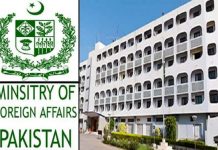مضمون کا ماخذ : کمپیوٹر لاٹری کی پیشن گوئی
Opp takes govt to task over new ordinances
The opposition parties on Sunday came down hard on the PTI-led government for amending laws that would pave way for penalising defamation against the army, judiciary, public servants and government institutions as well as allowing the lawmakers to address public gatherings during election campaigns. Taking to Twitter on Sunday, PML-N Vice President Maryam Nawaz said […]
The opposition parties on Sunday came down hard on the PTI-led government for amending laws that would pave way for penalising defamation against the army, judiciary, public servants and government institutions as well as allowing the lawmakers to address public gatherings during election campaigns.
Taking to Twitter on Sunday, PML-N Vice President Maryam Nawaz said the laws being amended by the government were apparently aimed to stifle dissent in the country but in reality they will be used against Prime Minister Imran Khan and his aides. “Whatever laws this government is amending are meant to silence the media and the opposition but these laws are going to be used against [PM] Imran & Company,” she wrote on the micro-blogging site.
Her comment came after President Arif Alvi signed two ordinances earlier in the day to make changes to the Prevention of Electronic Crimes Act, (PECA) 2016, and the Elections Act, 2017.
PPP Senator Sherry Rehman slammed the government for cancelling a scheduled session of the National Assembly without an official announcement and planning to promulgate two ordinances regarding election campaigning and social media.
A session of the National Assembly was scheduled for February 18 (Friday) only to be cancelled by President Dr Arif Alvi. The opposition had criticised the postponement as a move to stop PML-N President Shehbaz Sharif from avoiding his indictment in an alleged corruption case while reports claimed the session was shelved since the government wanted to promulgate some ordinances.
The PTI government, which has promulgated over 70 ordinances since August 2018, has been facing strong criticism for heavily relying on ordinances for legislation.
Senator Rehman added to that criticism, saying that the ordinance regarding campaigning would allow government ministers “unprecedented ability to misuse state resources”. She said it showed how “far gone” the government was in its “fear of the people”. She described the social media laws as “sweeping and draconian” in scope which would be used to further clamp down on dissent. “Make no mistake, this is not about protecting the vulnerable from cyber predations; quite the opposite,” she said.
Both laws were signed by the president after the cabinet approved them. The changes made in the electronic crimes act have been made under the Prevention of Electronic Crimes (Amendment) Ordinance, 2022. Under the ordinance, the definition of a “person” has been broadened to include any company, association, institution, organisation, authority, or any other. Furthermore, anyone found guilty of attacking a person’s “identity” will now be sentenced to five years instead of three years. The ordinance also states the informant or the complainant shall be “aggrieved person, his authorised representative, or his guardian, where such person is a minor or a member of the public in respect of a public figure or a holder of public office”.
Cases falling under PECA will be supervised by a high court and the trial court will have to conclude the case within six months. “The court shall submit a monthly progress report of any pending trial to the concerned high court and shall give reasons for the inability of the court to expeditiously conclude the trial,” says the ordinance. Apart from sending the report to the high courts, copies of the progress report will be sent to the law secretary if the case is registered in the Islamabad Capital Territory. However, if a case is registered in a province, then the copies of the report will be submitted to the “provincial secretaries of prosecution departments, the prosecutor general or advocate general”.
The other ordinance signed by the president makes changes in section 181 of the Election Act, 2017. The amendments have added a new section titled 181 (A) in the law. The new law allows a member of “parliament, provincial assembly or elected member of local government, including member holding any other office under the constitution or any other law, will be allowed to visit or address public meetings in “any area or constituency”.












